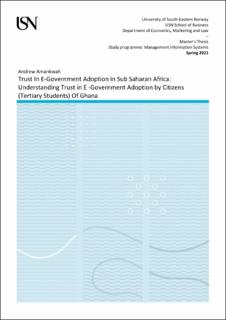| dc.contributor.advisor | Johannessen, Marius Rohde | |
| dc.contributor.author | Amankwah, Andrew | |
| dc.date.accessioned | 2023-12-08T14:36:41Z | |
| dc.date.available | 2023-12-08T14:36:41Z | |
| dc.date.issued | 2022 | |
| dc.identifier | no.usn:wiseflow:6592923:50522528 | |
| dc.identifier.uri | https://hdl.handle.net/11250/3106704 | |
| dc.description.abstract | Electronic government is changing the way governments operate, and nations across the globe are beginning on an e-Government journey to provide online services to citizens. This aim of this research is to study the level of trust of e - government by Ghanaians and how it results in its adoption. To assess whether individuals trust e-government and how trust in e-government influences intention to use, a nine-construct model is proposed. The approach was tested using 200 survey questionnaires distributed to Ghanaian tertiary students who utilize e-government. To support the quantitative data, a semi-structured interview was also undertaken.
According to the findings, Ghanaians trust their e-government, and trust in e-government has a strong effect on intention to use, and therefore adoption. The findings also show that Ghanaians trust e-government when they find it beneficial, and the website's quality is excellent. Familiarity with e-government had no significant impact on trust. | |
| dc.description.abstract | | |
| dc.language | eng | |
| dc.publisher | University of South-Eastern Norway | |
| dc.title | Trust In E-Government Adoption in Sub Saharan Africa: Understanding Trust in E -Government Adoption by Citizens (Tertiary Students) Of Ghana | |
| dc.type | Master thesis | |
